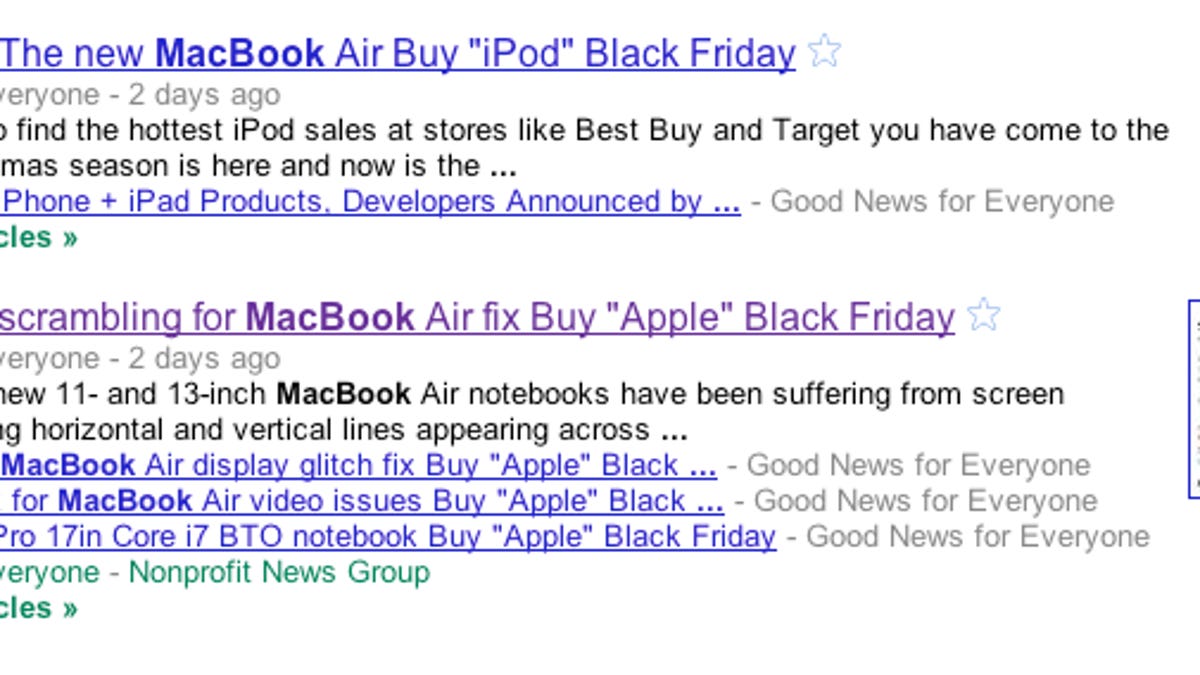Google News spammer has new site, same trick
After one of its sites was banned from Google News for spam, 70 Holdings simply continued business as usual under another domain over the weekend.

It didn't take very long for 70 Holdings--and a similar site tied to a Los Angeles-based search-engine optimization company--to start spamming Google News again.
Last week, after CNET pointed out that a company called 70 Holdings Inc. was spamming Google News under the moniker of Red Label News, Google pulled that content from its site. However, over the weekend 70 Holdings popped back up using one of the 44 domains it owns to once again flood Google News with the same type of nearly empty stories tied to search-friendly keywords and advertising.
Brooke Crothers, our chip correspondent, spotted a rash of spam stories on technology topics over the weekend posted by goodnewsforeveryone.com and nonprofitnewsgroup.com displayed prominently in Google News. WHOIS records confirm that both are associated with 70 Holdings, with nonprofitnewsgroup.com also having ties to a Los Angeles-based "boutique Public Relations and SEO company" called Lucid Public Relations.
Goodnewsforeveryone.com, according to WHOIS records, was registered by 70 Holdings and lists the same Maine prepaid mobile phone number found on redlabelnews.com's WHOIS record, which was either turned off or set to automatic voice-mail forwarding after CNET called the number on Thursday. Nonprofitnewsgroup.com, on the other hand, lists Lucid Public Relations as the registrant, with Marc Sevigny named as the contact and the Maine phone number.
However, an e-mail address for a Dan Sevigny is listed as the e-mail contact for nonprofitnewsgroup.com. Earlier today, Dan Sevigny was featured on Lucid's Web page as director of Internet marketing for the company and "specializes in internet marketing for small to medium sized businesses," according to his bio. But according to Lucid co-founders Ben Cooke and Jonathan Franks, he no longer works for the company, and his bio was deleted from Lucid's page after the co-founders spoke with CNET.
As it turns out, 70 Holdings also owns dansevigny.com, which appears to be the personal blog of a Los Angeles-based "Internet marketing and social media expert" named Dan Sevigny with the same e-mail address provided for consulting inquiries as the address listed on the WHOIS registration page for nonprofitnewsgroup.com. An e-mail to that address was not returned, although Franks called me and answered a few questions after Sevigny apparently forwarded the e-mail to him.
Sevigny left Lucid last month, Franks said, declining to elaborate, although Sevigny's extension is still listed for callers to Lucid's main phone number. He worked on search-engine optimization for Lucid's clients, which include health care companies, a plastic surgeon in Beverly Hills, and a DUI defense lawyer in Los Angeles. Both Franks and Cooke, who responded to a separate call to Lucid attempting to locate Sevigny, said they had no knowledge of nonprofitnewsgroup.com, 70 Holdings, or Sevigny's activities with Google News.
Yet a Benjamin Cooke from Los Angeles is listed as the registrant on a completely separate site, losangelespublicrelations.com, which appears to exist for no other reason than to "honor LUCID Public Relations for their outstanding achievements and overall excellence in the Public Realtions (sic) Industry" and redirect visitors to Lucid's main site. Cooke did not return a second call asking for more information about losangelespublicrelations.com, which lists one "jonathan at lucidpublicrelations.com" as its legal contact and the exact same mailing address as Lucid for its correspondence.
Lucid's site describes the company as:
LUCID Public Relations is a unique PR firm, because we have been one of the first and most successful firms at combining the powers of traditional PR with the ever increasing power of the internet. When consumers see a product or service featured on TV, radio or print, they go to the internet to find more information and to make a purchase-a powerful presence online is essential for the survival of any business today and LUCID Public Relations knows what it takes to get you to position #1 in search engines like Google, Yahoo, AOL, Bing and more.
In response to this new inquiry, Google said it had noticed the "news" sites over the weekend and would be reviewing them, with it very likely they receive the same treatment as Red Label News. However, it would not comment on whether it would be able to take action against all domains owned by 70 Holdings or Sevigny, or just the ones that CNET has so far identified.
Publishers are required to fill out a form to have their content listed in Google News, which is supposed to be verified by a person to make sure the site exists, is producing news content, and is the product of an organization as opposed to a single person. (News-producing sites run by a single person are considered blogs and go into Google Blog Search.) However, readers can also submit sites for consideration in Google News without having to submit a name or e-mail address.
Google would not comment on how often it re-evaluates that submission after reviewing it the first time. A source familiar with the situation said it appeared these sites had masqueraded as news operations for a period of time before turning into spam over the course of the last several weeks.
As we pointed out last week, Google has a problem if it can't figure out better ways to detect spam sites such as the ones run by 70 Holdings or at least rank them at the very bottom of search results. Otherwise, Google News will become much less useful.